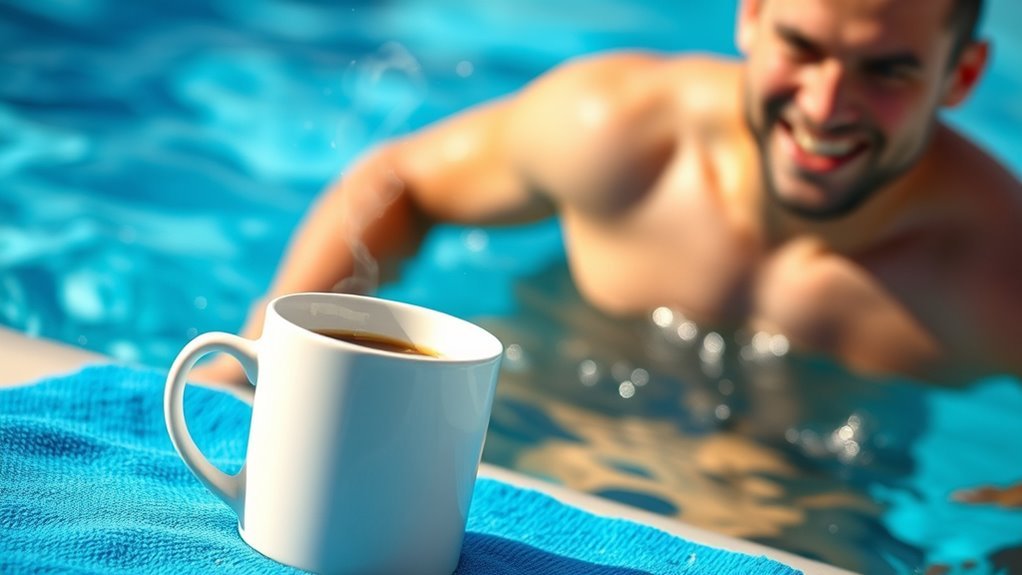The Benefits of Coffee for Swimmers
Coffee is an excellent tool for swimmers, boosting your endurance and focus. It enhances muscle performance and helps you utilize fat as fuel, delaying fatigue during tough laps. You’ll also notice improved reaction times and sharper concentration, allowing for better execution of strokes. Plus, caffeine reduces pain perception and aids recovery, getting you back in the pool sooner. Manage your hydration, and you’ll set yourself up for improved performance and personal bests. Discover more insights on optimizing your coffee use.
Enhanced Endurance

While you might enjoy your morning cup of coffee for its taste, it can also serve as a powerful ally in enhancing your endurance during swimming. Research shows that caffeine greatly improves muscle performance, allowing you to push through those tough laps. When you consume coffee before a swim, it increases adrenaline levels, which can lead to greater stamina improvement. This boost helps your body utilize fat as fuel, delaying fatigue and enhancing your overall performance. Additionally, studies suggest that caffeine can improve your perception of effort, making those challenging swims feel a bit easier. By incorporating coffee into your routine, you can maximize your endurance and enjoy a more liberating swimming experience, paving the way for personal bests in the pool.
Increased Focus and Concentration
When you’re in the pool, having sharp focus can make all the difference in your performance. Caffeine in coffee can enhance mental clarity, improve your reaction times, and boost cognitive function, helping you stay alert during training and competition. By incorporating coffee into your routine, you might find yourself more prepared to tackle those challenging sets with greater concentration.
Enhanced Mental Clarity
As you prepare for a swim, the boost in mental clarity that coffee provides can greatly enhance your focus and concentration. Research shows that caffeine is a powerful cognitive enhancer, helping to reduce mental fatigue and improve alertness. This effect is particularly beneficial when you’re gearing up for intense training or competition, as it allows you to maintain sharp focus on your technique and performance. By consuming coffee before your swim, you can better combat distractions and fatigue, enabling you to stay in the zone longer. The increased mental clarity not only helps you execute your strokes with precision but also fosters a more enjoyable swim experience. Embrace coffee as a tool to elevate your performance and maximize your freedom in the water.
Improved Reaction Times
Building on the enhanced mental clarity that coffee offers, swimmers also experience improved reaction times, which can be a game-changer in competitive settings. When you consume caffeine, your body ramps up caffeine metabolism, allowing for quicker response to race stimuli. This heightened state can meaningfully affect your performance in the pool.
Here are three ways coffee sharpens your reaction triggers:
- Increased Alertness: Caffeine blocks adenosine, enhancing your overall alertness during races.
- Faster Neural Responses: Coffee stimulates the central nervous system, leading to quicker nerve signal transmission.
- Improved Coordination: Enhanced focus helps you synchronize movements, vital for starts and turns.
Boosted Cognitive Function
Many athletes find that coffee considerably enhances their cognitive function, particularly regarding focus and concentration. The caffeine in coffee provides an alertness boost that can help you stay sharp during long training sessions or competitions. Research shows that caffeine consumption can improve memory enhancement, allowing you to retain and apply techniques more effectively. This heightened mental acuity is essential when you’re strategizing your performance or executing complex drills. Additionally, coffee can help you overcome mental fatigue, keeping your mind engaged throughout your workout. By incorporating coffee into your routine, you can reveal a new level of performance, ensuring that both your body and mind are fully prepared to tackle any challenge that comes your way.
Improved Reaction Times
When you’re diving into a race, every millisecond counts, and that’s where coffee can make a significant difference in your performance. Research shows that caffeine enhances your reaction times, which can be essential in competitive swimming. Here are three ways coffee helps improve your performance:
- Increased Alertness: Caffeine stimulates the central nervous system, making you more alert and ready to respond quickly.
- Enhanced Motor Skills: It can refine your fine motor skills, crucial for executing reaction time techniques off the blocks.
- Caffeine Sensitivity: Understanding your caffeine sensitivity helps you find the right amount for ideal performance without jitters.
Pain Reduction and Recovery

Although you might not think of coffee as a recovery aid, it can play a significant role in pain reduction and post-workout recovery for swimmers. Caffeine has been shown to provide effective pain relief by blocking adenosine receptors, which can diminish the perception of discomfort during and after intense training. This means you may feel less sore and recover faster, allowing you to dive back into the water sooner. Additionally, coffee can enhance muscle recovery by increasing the availability of glycogen, helping replenish your energy stores. Incorporating a cup of coffee into your routine after swimming can elevate your recovery process, making it a practical choice for those seeking freedom from post-exercise fatigue and soreness. Embrace the benefits and enjoy your swim!
Hydration Considerations
While coffee can aid in recovery, it’s important to take into account its effects on hydration, especially for swimmers. Maintaining your hydration balance is essential, and caffeine effects can complicate this. Here are three considerations to keep in mind:
Coffee can support recovery, but swimmers must be mindful of its hydration impacts. Balance is crucial for optimal performance.
- Moderation is Key: Limit your coffee intake to avoid excessive caffeine, which can lead to increased urination and potential dehydration.
- Hydrate Alongside: Always drink water with your coffee to counteract its diuretic effects and maintain hydration balance.
- Listen to Your Body: Pay attention to how your body responds to coffee. If you notice signs of dehydration, you might want to adjust your consumption.
Optimal Timing for Consumption

To maximize the benefits of coffee for your swimming performance, timing your consumption is essential. Ideally, you should incorporate coffee into your pre workout ritual about 30 to 60 minutes before you hit the pool. This timing allows caffeine to reach peak levels in your bloodstream, enhancing your focus and energy. Studies suggest that caffeine can improve endurance and reduce perceived effort, making your swim feel easier and more efficient. However, avoid consuming coffee too close to your workout, as it might lead to jitters or discomfort. By fine-tuning your caffeine timing, you’ll access the potential of coffee to elevate your swimming performance, giving you the freedom to push your limits in the water.
Frequently Asked Questions
Can Coffee Improve My Swim Speed?
Yes, coffee can improve your swim speed due to its caffeine effects. Research shows that caffeine can enhance swim performance by increasing alertness and reducing perceived effort. This means you might feel less fatigued and swim faster. Just be cautious with your intake; too much caffeine can lead to jitters or dehydration. If you experiment with it before training or competitions, you might find the ideal amount that boosts your performance without negative side effects.
Is Decaf Coffee Beneficial for Swimmers?
Decaf coffee can still offer some advantages for swimmers, even without the caffeine kick. It contains antioxidants that may help reduce inflammation and aid recovery. If you’re seeking caffeine alternatives, decaf could be a good choice to enjoy the taste and benefits without the jitters. Plus, staying hydrated is essential, and decaf can contribute to your fluid intake. So, if you love coffee, don’t hesitate to savor that decaf brew!
How Much Coffee Is Too Much?
You might think you can drink coffee like it’s water, but too much caffeine can be a slippery slope! Generally, if you’re consuming over 400 mg of caffeine daily, you may hit your limits, depending on your caffeine tolerance. It’s essential to balance your intake with proper hydration levels, as excessive coffee can lead to dehydration. Listen to your body’s signals, and find a balance that keeps you energized without going overboard!
Does Coffee Affect Sleep Quality for Athletes?
Yes, coffee can affect sleep quality for athletes. Caffeine metabolism varies among individuals; for some, it can disrupt sleep cycles, especially if consumed too close to bedtime. Studies show that caffeine may reduce total sleep time and alter deep sleep patterns. If you’re aiming for ideal recovery and performance, it’s essential to monitor your coffee intake and timing. Consider limiting consumption in the late afternoon and evening for better sleep quality.
Can I Drink Coffee Before Morning Practices?
Imagine your morning practice like a race, where every second counts. You can definitely sip coffee before you plunge into it, but timing’s key. Caffeine can boost your energy, but don’t forget about your hydration balance—balance that cup of joe with plenty of water. Studies show consuming caffeine about 30 to 60 minutes prior can enhance your performance without compromising sleep. Just listen to your body and find what fuels your freedom best!






